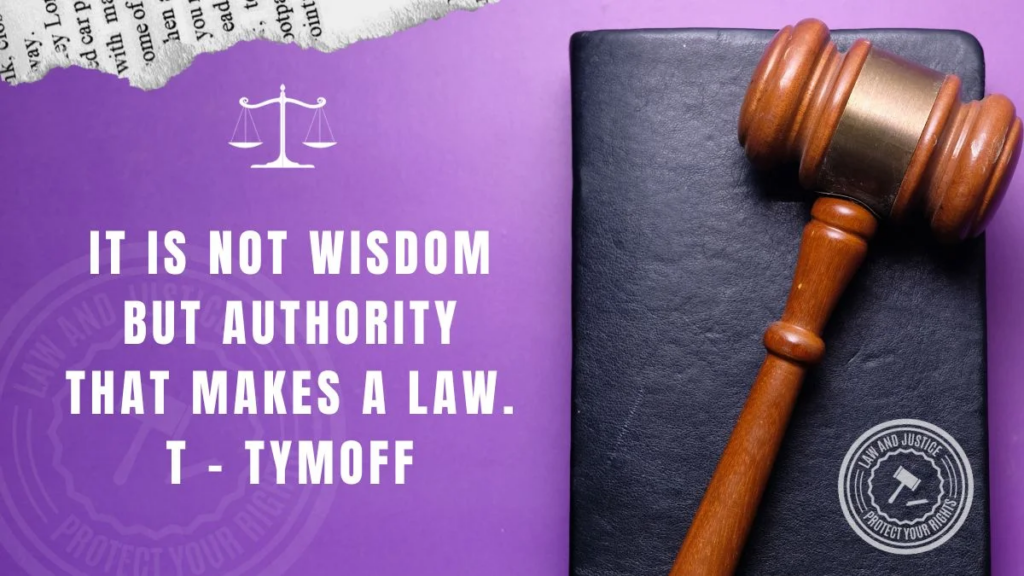It is Not Wisdom but Authority that Makes a Law. t – Tymoff, Authority in lawmaking has been a cornerstone of societies throughout history, shaping how rules are created and enforced. But what about wisdom? Does the essence of a law lie in its authoritative decree or in the wisdom embedded within its provisions? Let’s delve into this age-old debate and explore the nuanced relationship between authority and wisdom in the realm of legislation.
Introduction
Laws serve as the backbone of social order, delineating boundaries and guiding behavior within communities. Traditionally, the authority vested in lawmakers has been paramount, dictating what is legal and what is not. However, the concept of wisdom introduces a deeper layer of consideration into how laws are formulated and applied.
Understanding Authority in Lawmaking
Authority, in the context of lawmaking, refers to the power granted to lawmakers and governing bodies to create and enforce rules. It derives legitimacy from various sources such as constitutions, legislative mandates, and judicial precedents. This authority provides the framework within which laws are codified and implemented, ensuring compliance and order within society.
Sources of Authority in Law
Authority can stem from:
- Constitutional provisions
- Legislative acts
- Judicial rulings
Wisdom in Lawmaking
Contrasting with authority, wisdom in lawmaking embodies the notion of sound judgment, foresight, and ethical consideration in crafting legislation. Wisdom seeks to discern what is just and equitable, taking into account the long-term implications and societal impact of laws beyond immediate enforcement.
Role of Wisdom in Shaping Laws
Wisdom involves:
- Ethical deliberation
- Balancing conflicting interests
- Long-term societal benefit
Historical Perspectives

Throughout history, civilizations have grappled with the balance between authority and wisdom in their legal frameworks. Ancient societies often relied heavily on authoritative decrees backed by rulers or religious edicts. In contrast, philosophical traditions such as those in ancient Greece and Rome emphasized the importance of wisdom and rationality in governance.
Ancient Civilizations and Authority in Law
Examples include:
- Hammurabi’s Code
- Roman Twelve Tables
Philosophical Viewpoints on Wisdom in Law
Philosophers like:
- Plato
- Aristotle
Examples from Legal Systems
Contemporary legal systems around the world exhibit varying degrees of reliance on authority versus wisdom in their legislative processes. Some legal frameworks prioritize the authority of legislative bodies and executive branches to enact and enforce laws, emphasizing obedience and stability.
Authority-Based Legal Systems
Examples include:
- Civil law jurisdictions
- Authoritarian regimes
Wisdom-Based Legal Systems
Examples include:
- Common law traditions
- Democratic societies
Impact on Society
The type of laws crafted—whether authoritative or wise—has profound implications for society. Authoritative laws often promote order and predictability but can sometimes stifle individual freedoms or perpetuate injustices. In contrast, wise laws aim to promote fairness, equality, and societal well-being, fostering trust and cooperation among citizens.
Effects of Authoritative Laws on Citizens
Impacts:
- Compliance and deterrence
- Social conformity
Benefits of Wise Laws to Society
Benefits:
- Justice and equity
- Social cohesion
Challenges and Criticisms
Both authoritative and wisdom-based approaches face criticisms and challenges in their application. Authoritative laws may be seen as rigid and unresponsive to changing societal norms, while wisdom-centric approaches may be criticized for subjectivity and ambiguity.
Issues with Authoritative Laws
Challenges:
- Flexibility vs. stability
- Adaptation to new circumstances
Pitfalls of Wisdom-Centric Approaches
Concerns:
- Interpreting wisdom
- Consistency in application
Modern Applications
In contemporary times, the interplay between authority and wisdom continues to evolve amid complex societal challenges and technological advancements. Legal systems increasingly strive to integrate both authoritative mandates and wise considerations to meet the needs of diverse populations and global interconnectedness.
Contemporary Examples of Authority in Legislation
Examples:
- Emergency laws
- Security regulations
Incorporating Wisdom into Modern Legal Frameworks
Efforts include:
- Ethical guidelines
- Public consultation processes
Balance and Synthesis
Achieving a harmonious balance between authority and wisdom in lawmaking is essential for fostering a just and effective legal system. Contextual factors, societal values, and practical considerations must all be weighed to ensure laws are both enforceable and ethical.
Finding a Balance Between Authority and Wisdom
Considerations:
- Legal realism
- Democratic principles
Ethical Considerations
Ethics play a crucial role in evaluating the legitimacy and effectiveness of laws crafted through authoritative or wisdom-based approaches. The ethical dimensions encompass issues of fairness, accountability, and the promotion of human rights within legal frameworks.
Ethical Implications of Authoritative Laws
Considerations:
- Human rights
- Rule of law
Ethical Dimensions of Wise Legislation
Considerations:
- Social justice
- Ethical governance
Public Perception
Public trust and acceptance of laws often hinge on whether they are perceived as legitimate and beneficial. Understanding how authority and wisdom influence public attitudes can provide insights into enhancing the effectiveness and responsiveness of legal systems.
Public Trust in Authoritative Laws
Factors influencing trust:
- Transparency
- Consistency
Public Acceptance of Wise Laws
Factors influencing acceptance:
- Fairness
- Public participation
Future Trends
Looking ahead, the trajectory of lawmaking is shaped by emerging trends such as globalization, technological advancements, and evolving societal norms. The balance between authoritative mandates and wisdom-driven approaches will continue to evolve, influencing the development of legal frameworks worldwide.
Trends Towards More Authoritative or Wise Laws
Predictions:
- Technological influences
- Global governance
Conclusion
In conclusion, the debate over whether authority or wisdom should prevail in lawmaking is multifaceted and enduring. While authority provides the necessary structure and enforcement mechanisms, wisdom ensures that laws are just, equitable, and responsive to societal needs. Ultimately, a balanced approach that integrates both elements is crucial for fostering a legal system that commands respect, trust, and legitimacy.
FAQs
- What is the difference between authority and wisdom in lawmaking?
- Authority refers to the power to create and enforce laws, often derived from legal frameworks or governmental structures. Wisdom involves ethical judgment and foresight in crafting laws that promote fairness and societal well-being.
- Why are authoritative laws sometimes criticized?
- Authoritative laws can be criticized for being rigid and unresponsive to changing societal norms, potentially perpetuating injustices or lacking flexibility in application.
- How can wisdom be integrated into modern legal frameworks?
- Wisdom can be integrated by incorporating ethical guidelines, engaging in public consultation processes, and considering long-term societal impacts in legislative decisions.
- What role does public perception play in lawmaking?
- Public trust and acceptance of laws are influenced by whether they are perceived as fair, transparent, and beneficial to society. Both authority and wisdom contribute to shaping public attitudes towards legislation.
- What are some future trends in lawmaking?
- Future trends include the impact of technology on legal systems, global harmonization of laws, and the evolving balance between authoritative mandates and wise legislative practices.



